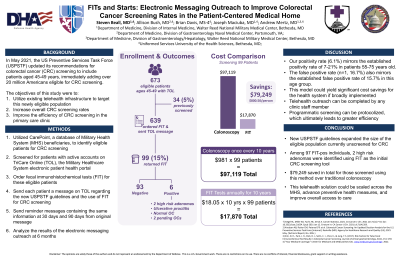Back


Poster Session E - Tuesday Afternoon
Category: Colorectal Cancer Prevention
E0179 - FITs and Starts: Electronic Messaging Outreach to Improve Colorectal Cancer Screening Rates in the Patient-Centered Medical Home
Tuesday, October 25, 2022
3:00 PM – 5:00 PM ET
Location: Crown Ballroom

Has Audio

Steven Beall, MD
Walter Reed National Military Medical Center
Bethesda, MD
Presenting Author(s)
Steven Beall, MD, Brian Davis, BS, Joseph Maciuba, MD, Andrew Mertz, MD, Allison Bush, MD
Walter Reed National Military Medical Center, Bethesda, MD
Introduction: In 2021, the United States Preventive Services Task Force recommended colorectal cancer (CRC) screening begin at age 45 instead of age 50 in all adults of average CRC risk. Top tier screening tools include annual fecal immunochemical test (FIT) or colonoscopy every ten years. We implemented a quality improvement project to assess the effectiveness of electronic messaging outreach on CRC screening by offering a pre-ordered FIT to eligible patients.
Methods: All patients ages 45-49 in the Walter Reed Internal Medicine Patient Centered Medical Home due for CRC screening were identified using CarePoint, a Department of Defense healthcare database. Patients with a history of IBD, CRC, colectomy, or without an active Tricare Online (TOL) account were excluded. A FIT was ordered and a standardized message was sent explaining the expanded screening age and screening options. Reminder messages were sent approximately 30 days and 90 days after the initial message. The outcome measured was the number of patients who underwent colorectal cancer screening in the six month period.
Results: Six hundred seventy-three patients ages 45-49 were identified as needing CRC screening and have active TOL accounts. Thirty-four (5%) patients had previous screening not registered by CarePoint. 96 (15%) of the remaining patients returned their FIT tests. Negative FITs returned for 90 people and 6 FITs were positive. Of the positive FITs, high risk adenomas were identified on two colonoscopies, one patient had ulcerative proctitis, one was normal, and two colonoscopies are pending.
Discussion: Recent changes to CRC screening guidelines starting at an earlier age have dramatically increased the eligible patient pool. FIT is an easily performed, low cost, screening tool available in the primary care setting. This initiative alone will conservatively save $76,047 over 10 years compared to colonoscopy and improves access to care for high risk populations requiring GI appointments and endoscopies.
Additionally, this project identifies that improving CRC screening can be achieved without utilizing clinician time, optimizing time in patient care. The identification of patients due for screening with TOL, placement of FIT orders, and sending outreach messaging can be completed by any trained team member which is consistent with goals of the medical home model. This protocol could be employed within MHS to streamline care, decrease healthcare expenditures, and most importantly improve the rates of colorectal cancer screening.
Disclosures:
Steven Beall, MD, Brian Davis, BS, Joseph Maciuba, MD, Andrew Mertz, MD, Allison Bush, MD. E0179 - FITs and Starts: Electronic Messaging Outreach to Improve Colorectal Cancer Screening Rates in the Patient-Centered Medical Home, ACG 2022 Annual Scientific Meeting Abstracts. Charlotte, NC: American College of Gastroenterology.
Walter Reed National Military Medical Center, Bethesda, MD
Introduction: In 2021, the United States Preventive Services Task Force recommended colorectal cancer (CRC) screening begin at age 45 instead of age 50 in all adults of average CRC risk. Top tier screening tools include annual fecal immunochemical test (FIT) or colonoscopy every ten years. We implemented a quality improvement project to assess the effectiveness of electronic messaging outreach on CRC screening by offering a pre-ordered FIT to eligible patients.
Methods: All patients ages 45-49 in the Walter Reed Internal Medicine Patient Centered Medical Home due for CRC screening were identified using CarePoint, a Department of Defense healthcare database. Patients with a history of IBD, CRC, colectomy, or without an active Tricare Online (TOL) account were excluded. A FIT was ordered and a standardized message was sent explaining the expanded screening age and screening options. Reminder messages were sent approximately 30 days and 90 days after the initial message. The outcome measured was the number of patients who underwent colorectal cancer screening in the six month period.
Results: Six hundred seventy-three patients ages 45-49 were identified as needing CRC screening and have active TOL accounts. Thirty-four (5%) patients had previous screening not registered by CarePoint. 96 (15%) of the remaining patients returned their FIT tests. Negative FITs returned for 90 people and 6 FITs were positive. Of the positive FITs, high risk adenomas were identified on two colonoscopies, one patient had ulcerative proctitis, one was normal, and two colonoscopies are pending.
Discussion: Recent changes to CRC screening guidelines starting at an earlier age have dramatically increased the eligible patient pool. FIT is an easily performed, low cost, screening tool available in the primary care setting. This initiative alone will conservatively save $76,047 over 10 years compared to colonoscopy and improves access to care for high risk populations requiring GI appointments and endoscopies.
Additionally, this project identifies that improving CRC screening can be achieved without utilizing clinician time, optimizing time in patient care. The identification of patients due for screening with TOL, placement of FIT orders, and sending outreach messaging can be completed by any trained team member which is consistent with goals of the medical home model. This protocol could be employed within MHS to streamline care, decrease healthcare expenditures, and most importantly improve the rates of colorectal cancer screening.
Disclosures:
Steven Beall indicated no relevant financial relationships.
Brian Davis indicated no relevant financial relationships.
Joseph Maciuba indicated no relevant financial relationships.
Andrew Mertz indicated no relevant financial relationships.
Allison Bush indicated no relevant financial relationships.
Steven Beall, MD, Brian Davis, BS, Joseph Maciuba, MD, Andrew Mertz, MD, Allison Bush, MD. E0179 - FITs and Starts: Electronic Messaging Outreach to Improve Colorectal Cancer Screening Rates in the Patient-Centered Medical Home, ACG 2022 Annual Scientific Meeting Abstracts. Charlotte, NC: American College of Gastroenterology.

